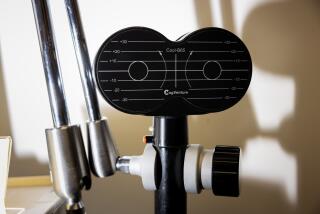3 Alcoholism Therapies Found Equally Effective
- Share via
WASHINGTON — A groundbreaking study of alcoholism treatment has reached the surprising conclusion that all three leading behavioral approaches work equally well for a wide variety of patients, regardless of sex, psychological condition, motivation or the extent of their drinking problems.
The findings undermine long-held beliefs about the nation’s nearly 14 million alcoholics. Treatment professionals have long thought that each of the three therapies was most effective on patients who showed certain traits.
For example, experts believed that individuals who demonstrated severe drinking problems, and who typically were under heavy social pressure from friends and family to drink, responded better to the “12-step” program similar to that provided by Alcoholics Anonymous.
Similarly, cognitive therapy was thought to work best for women and for those who suffer from psychological problems, while motivational therapy was considered best for those with “low degrees of motivation,” according to Thomas F. Babor, a professor of psychology at the University of Connecticut School of Medicine and a researcher on the study.
But the ambitious eight-year study sponsored by the National Institute on Alcohol Abuse and Alcoholism showed that those considered best served by “12-step” programs--and others--appeared to do equally well using any one of the three therapeutic approaches.
The popular theories “in general, did not pan out,” said Dr. Enoch Gordis, director of the institute. “The goal of science is not to find out what we’d like to believe but what is.” The results of “Project MATCH” can be reassuring because patients “do not have to worry that something better might have been achieved with another treatment,” Gordis said.
The findings appear in the January 1997 issue of the Journal of Studies on Alcohol, the oldest journal in the field of alcohol research.
Alcohol abuse and alcohol dependence are regarded as serious conditions in this country. More than 100,000 people die annually from alcohol-related causes, including cirrhosis of the liver, suicide and accidents.
Those suffering from alcoholism are also prone to other health problems, including neurological disorders, cardiovascular damage, pancreatic disease and other liver ailments.
The condition also exacts a major toll not only on the lives of drinkers but on their families and friends as well.
Alcoholism is regarded as a complex disorder that involves numerous factors, including a genetic component.
Experts believe that alcoholism can be treated in a variety of ways, including behavioral therapy and, for some people, the use of drugs--or a combination of both. This study looked only at behavioral therapy.
The research examined three types of 12-week programs: “12-step” therapy, cognitive therapy and motivational therapy.
The 12-step approach encourages patients to participate in traditional Alcoholics Anonymous activities that promote fellowship among recovering alcoholics. The AA formula emphasizes 12 “steps” to recovery, beginning with “acceptance” and “surrender.” Those with the most severe drinking problems were thought to do better with the 12-step approach.
The cognitive approach is designed to help patients develop skills to control their thoughts about alcohol and deal with urges to drink, Babor said. Patients are taught, for example, how to refuse a drink in high-risk situations and how to manage negative moods that might lead them to drink.
Motivational therapy Babor said, is designed to help patients rally their personal resources and promote their individual responsibility to abstain from drinking. It presents the ability to change as a force to be unleashed within each patient, rather than something to be learned from a therapist.
For the study, researchers recruited 1,726 patients and screened them for individual traits, such as the severity of their drinking problems, their level of motivation to overcome them and the extent of their psychological problems.
The patients were then enrolled in two parallel arms of the study that matched them to various treatments.
In addition, some patients received only outpatient care, while others received inpatient or day hospital treatment combined with after-care therapy.
All the participants showed “significant and sustained” improvement in the number of days they abstained from alcohol and a decreased number of drinks on those days they drank, researchers said.
“The striking differences in drinking from pre-treatment levels to all follow-up points suggest that participation in any of the MATCH treatments would be associated with marked positive change,” Babor said.
Before treatment, patients drank about 25 days out of the month and consumed large quantities of alcohol. The treatments reduced their drinking to about six days a month, with less consumed during each episode, “regardless of the treatment patients received,” said Gerard J. Connors, senior research scientist with the New York State office of Alcoholism and Substance Abuse Services.
There were only a few differences among the three treatments in either treatment arm. For example, outpatients who received 12-step treatment were more likely to remain completely abstinent the following year than outpatients who received the other treatments.
Researchers also found that outpatients with moderate psychological problems did somewhat better with the 12-step program than with other approaches, although that match was not among those believed appropriate at the outset of the study.
The patients also showed declines in the use of other drugs and depression and improved liver function, improvements that were maintained throughout the 12 months following treatment, when most relapses typically occur, the researchers said.






